Learn everything you need to know about RV solar panels with our ultimate beginner’s guide. What are RV solar panels? How do they work? Are they worth it? We’ve got you covered.
Are you tired of relying on noisy generators or paying high camping fees to plug into electrical hookups every time you hit the road in your RV?
Do you wish you could spend more time off-grid, away from the crowds?
If so, it’s time to consider installing solar panels on your rig.
This eco-friendly, cost-effective solution will free you to camp off the grid and provide reliable power for all your appliances and electronics.
However, the process can seem overwhelming if you’re new to RV solar systems.
Don’t worry, though. This beginner’s guide will walk you through everything you need to know about RV solar panels and how to choose the right system for your needs.
We’ve spent over four years living full-time in an RV and relying heavily on our solar system. So, we know firsthand the benefits and challenges of going solar.
Our solar panels have been crucial to our nomadic lifestyle, from powering our laptops and charging our phones to running the fridge and lights.
We’ve learned how to optimize energy usage, troubleshoot issues, and maintain our system to keep it running smoothly.
Our experience has given us a deep understanding of how an RV solar system works and what it takes to set up and maintain them for optimal performance.
So sit back, grab a cup of coffee, and get ready to learn all about the exciting world of RV solar power!
What Are RV Solar Panels?
RV solar panels are essentially photovoltaic (PV) panels that convert sunlight into electricity.
They’re designed to be mounted on the roof of an RV or propped up beside the camper. There, they can capture most sunlight exposure throughout the day.
The electricity generated by the panels is then stored in batteries, which power your RV’s appliances and electronics when you’re not connected to an electrical hookup.
Types Of Solar Panels For RVs
In the following sections, we’ll look closely at the advantages and disadvantages of the different types of solar panels for RVs. Then you can choose the best option for your specific needs and budget.
Permanent Fixed Solar Panels
If you’re looking for a more permanent solution to powering your RV with solar energy, then fixed solar panels are the way to go.
These panels are mounted on your RV’s roof and can be either flexible or rigid.

Flexible panels are made from thin-film technology and can conform to the shape of your RV’s roof, making them easier to install.
Rigid panels, conversely, are made from monocrystalline cells and come in standard sizes that need to be fitted onto the roof.
One of the main advantages of fixed solar panels is that they provide a constant power source without requiring manual setup every time you park your RV.
They also tend to have higher power output than portable solar panels, so they harvest more sunlight.
Fixed solar panels are typically more durable than portable ones since they’re not exposed to as much wear and tear during transport.
There are some downsides to consider too.
- Installing a solar panel system on an RV roof can be challenging.
- Secondly, shading can significantly affect efficiency depending on where you park your RV.
- Lastly, if something goes wrong with one panel in a series of connected ones, it will affect the entire system’s performance.
Portable Solar Panels
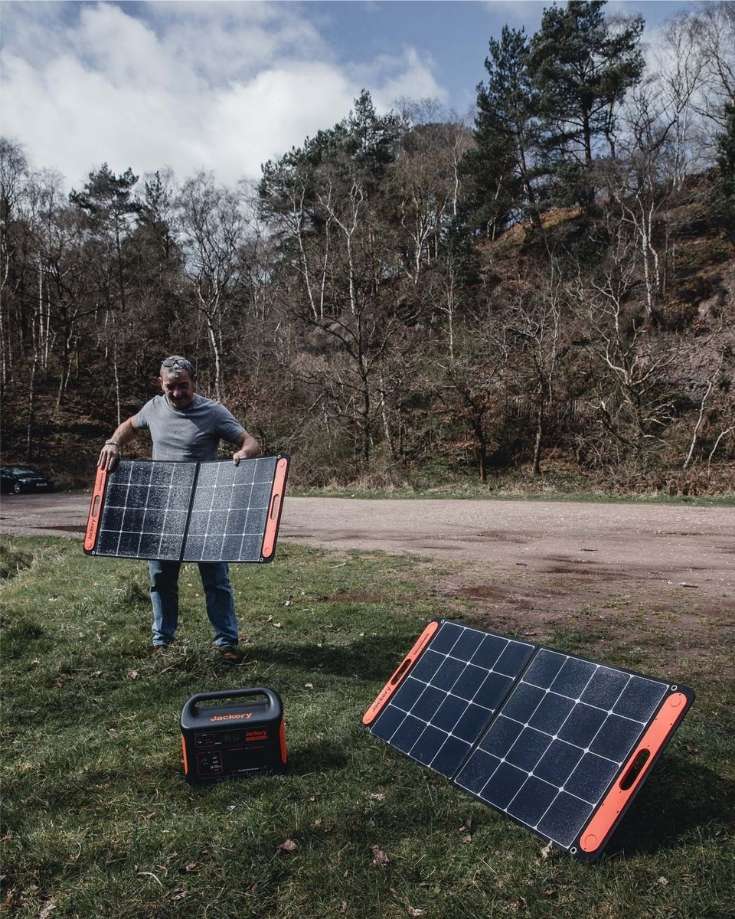
Portable solar panels for RVs are a great option if you want flexibility in your power source.
They come with their own stands or can be placed at different angles to get the best sunlight exposure, and they can be moved around depending on where you park your RV.
Portable panels are usually much easier to install than permanent ones since they don’t require drilling or wiring into your RV’s electrical system.
One of the main advantages of portable panels is that they’re versatile and can be used in different locations.
If you park your RV in a shaded area, you can move the panels to a sunnier spot for optimal charging.
Portable panels are a great investment if you only need occasional power or want to use them for other outdoor activities like camping or hiking.
However, there are some downsides to consider when it comes to portable panels.
- Firstly, they tend to have lower power output than fixed systems because of their smaller size. This means you may be unable to run as many appliances and electronics off them simultaneously.
- Secondly, portability also means increased vulnerability to damage from transport or weather conditions.
Solar Generators

Solar generators don’t really fit into this article, but we’d be remiss not to mention them anyway.
A portable solar generator is a device that uses solar panels to collect energy from the sun and convert it into electricity to power appliances and electronics in your RV.
Unlike fixed solar panels or portable solar panels, a portable solar generator is an all-in-one unit that usually includes solar panels, battery storage, and an inverter.
Solar generators are a great option for small RVs or van conversions, especially where energy demand is low and isn’t used frequently.
Which Type Of Solar Panel Is Best For RVs?
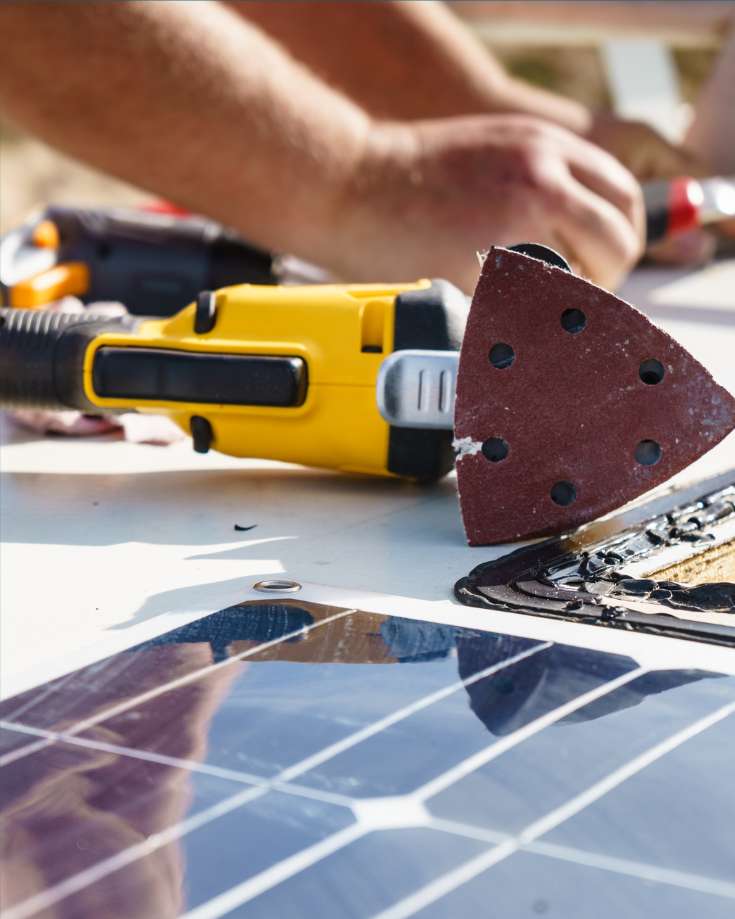
Each type of solar panel has pros and cons, and the best choice depends on your specific needs and lifestyle.
Solar generators are all-in-one units that include solar panels, battery storage, and an inverter.
They’re highly portable and don’t require any installation or wiring into your RV’s electrical system.
Solar generators are ideal for those who need occasional power or want flexibility in setting up their system when parking at different locations.
They’re perfect for weekend getaways or camping trips where you don’t have access to a power source.
Permanently fitted solar panels are mounted on your RV’s roof and connected directly to your RV’s electrical system.
They offer high efficiency and can provide enough power for extended off-grid living.
If you live full-time in an RV or plan on taking long-term trips off-grid, permanently fitted solar panels may be your best option.
Portable solar panels are a great option if you’re looking for flexibility in your power source. They come with their own stands and can be placed at different angles to get the best sunlight exposure, and they can be moved around depending on where you park your RV.
Portable panels are also much easier to install than permanent ones since they don’t require drilling or wiring into your RV’s electrical system.
Portable panels are perfect for those who want versatility in their power source but still need enough energy to run appliances like refrigerators or air conditioners.
We’ve had experience with all three types of solar panel options and recommend considering your specific needs before deciding.
If you plan on using your RV frequently or living off-grid for extended periods regularly, then permanently fitted systems might be worth investing in for their convenience and efficiency.
However, if you only need occasional power or want flexibility in setting up your system when parking at different locations, a portable solar generator or solar panel may suit you better.
In summary:
- Solar generators: Ideal for occasional use and portability.
- Permanently fitted solar panels: Ideal for full-time living off-grid.
- Portable solar panels: Ideal for versatility and ease of installation or adding extra solar to an existing system.
How Do RV Solar Panels Work?
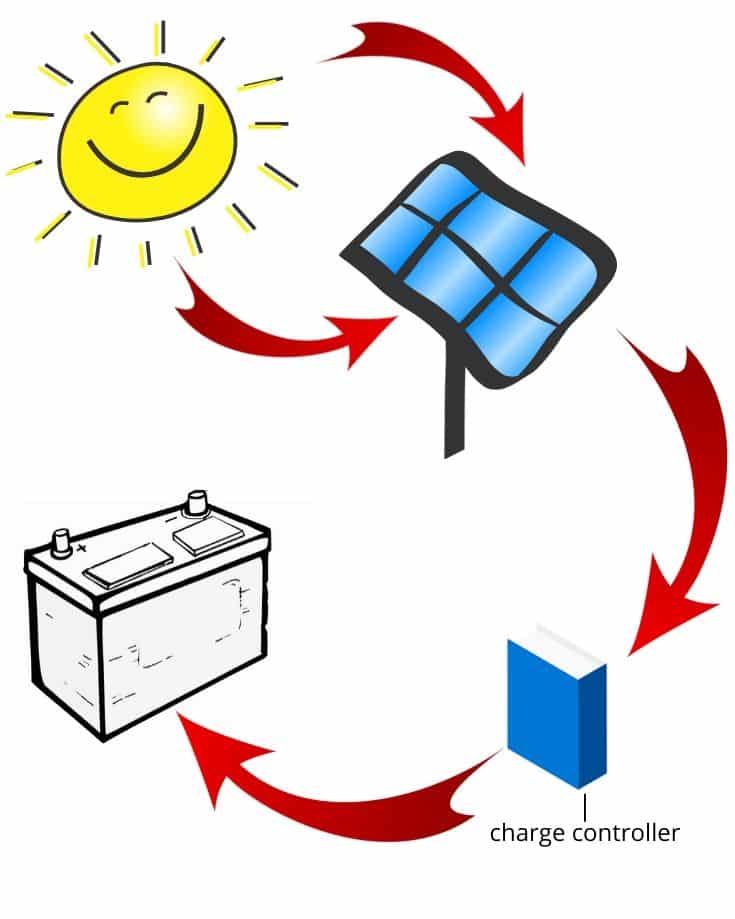
Solar panels work by converting sunlight into electricity that can be used to power appliances and electronics in your RV.
The process starts with the solar panels themselves, which are made up of photovoltaic (PV) cells that absorb sunlight and convert it into direct current (DC) electricity.
The DC electricity produced by the solar panels is then sent to a charge controller, which regulates the amount of current going into your RV’s battery bank.
This is important because too much current can damage your batteries, while too little voltage won’t fully charge them.
Once the batteries are charged sufficiently, you can use the DC energy directly.
Many appliances and electronics designed for RVs run on DC power. You can connect those circuits to the battery, and you’re good to go.
AC power is the type of electricity found in most homes and buildings. It runs on alternating current, which fluctuates between positive and negative voltage.
AC power is ideal for powering large appliances like residential refrigerators or air conditioners. However, to use AC appliances, you must convert the battery’s DC power to AC.
That’s where an inverter becomes essential.
In summary:
- Solar panels convert sunlight into DC electricity.
- A charge controller regulates the amount of current going into your RV’s battery bank.
- An inverter converts DC electricity into AC electricity for use with appliances and electronics.
RV Solar System Components
If you’re considering adding solar panels to your RV, it’s important to understand the various components that make up the system.
Each component plays a crucial role in harnessing the sun’s power and providing electricity for your RV, from solar panels and charge controllers to inverters and batteries.
In this section, we’ll take a quick look at each component and explain how they work together to create an efficient and reliable RV solar system.
RV Solar Panels
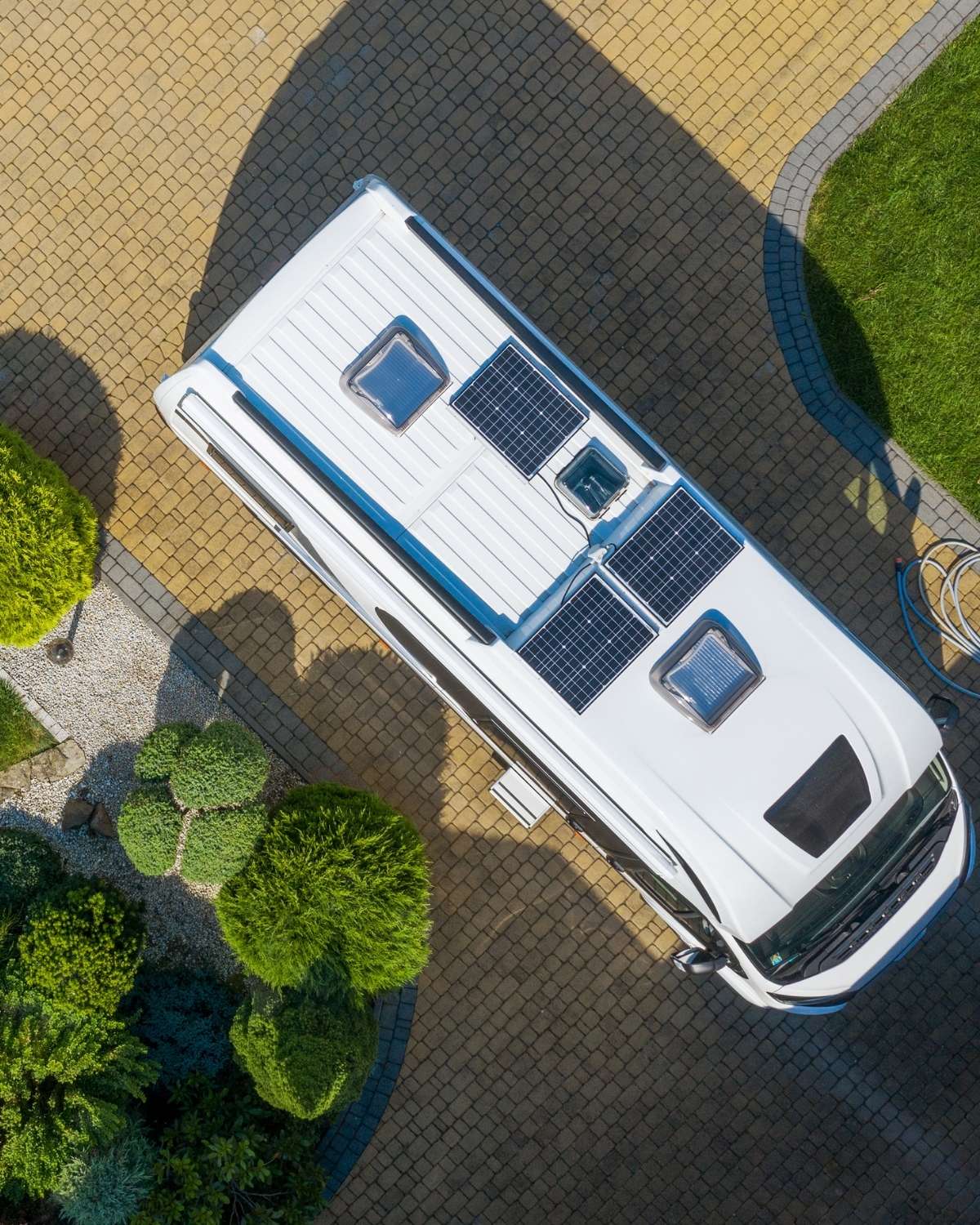
When it comes to off-grid solar systems, the solar panels themselves are arguably the most important component.
After all, they’re responsible for capturing sunlight and converting it into electricity.
A few things to consider when choosing solar panels for your RV include:
- the type of panel,
- its efficiency rating, and
- size.
Additionally, how you mount your solar panels can greatly impact how much power they can produce.
Ideally, your panels should be mounted where they’ll receive as much direct sunlight as possible throughout the day.
This could mean installing them on special tilt mounts so you can adjust them to the conditions.
Solar Charge Controller
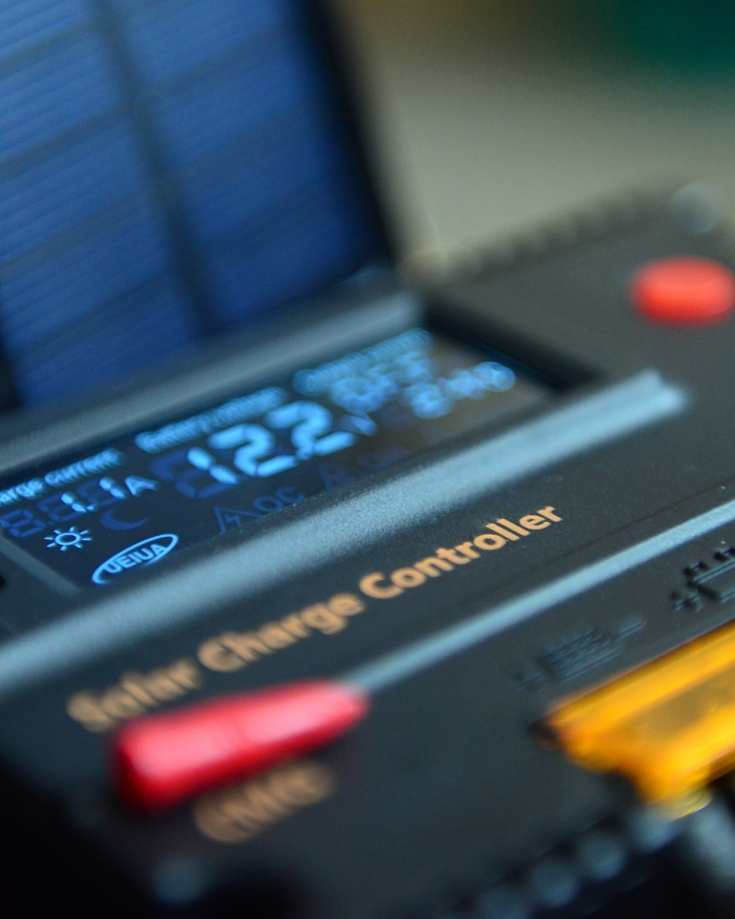
While solar panels are responsible for collecting sunlight and generating electricity, a solar charge controller regulates the amount of power that flows into your RV’s batteries.
Without a charge controller, your batteries could become overcharged or damaged due to excessive voltage from the panels.
There are two main types of solar charge controllers:
- PWM (Pulse Width Modulation), and
- MPPT (Maximum Power Point Tracking).
While PWM controllers are less expensive, they’re less efficient than MPPT controllers.
MPPT solar charge controllers are smarter in charging the battery, making them far superior in performance.
Though they may be more expensive than PWM models, the increased efficiency and higher overall output make them a worthwhile investment for any serious RVer looking to get the most out of their solar system.
Battery Bank
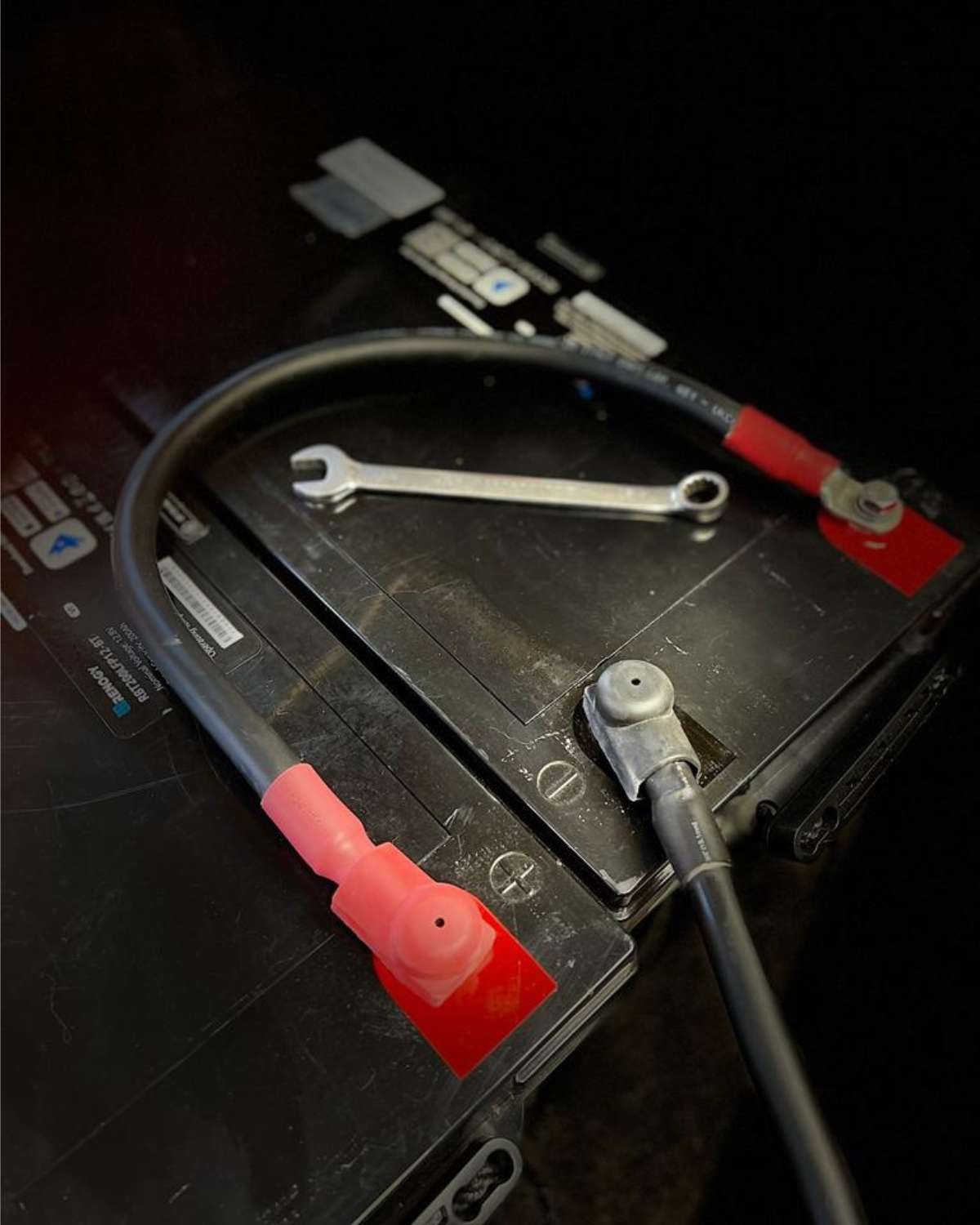
A battery bank is a crucial component of any RV solar system, as it stores the energy your solar panels generate for use when the sun isn’t shining.
Essentially, your battery bank acts as a “backup” power source that you can rely on when you’re not connected to shore power or running your generator. Two main types of batteries are used in an RV solar system:
- lead-acid, and
- lithium.
While lead-acid batteries are less expensive initially, they have a shorter lifespan and can only be discharged to about 50% of their capacity.
Lithium batteries are more expensive upfront but last longer and can be discharged to 100% if necessary without long-term damage. With more usable energy, you can have fewer batteries and save space.
For those who enjoy boondocking or camping off-grid for extended periods, we recommend investing in high-quality lithium batteries to ensure reliable power no matter where your travels take you.
Inverter
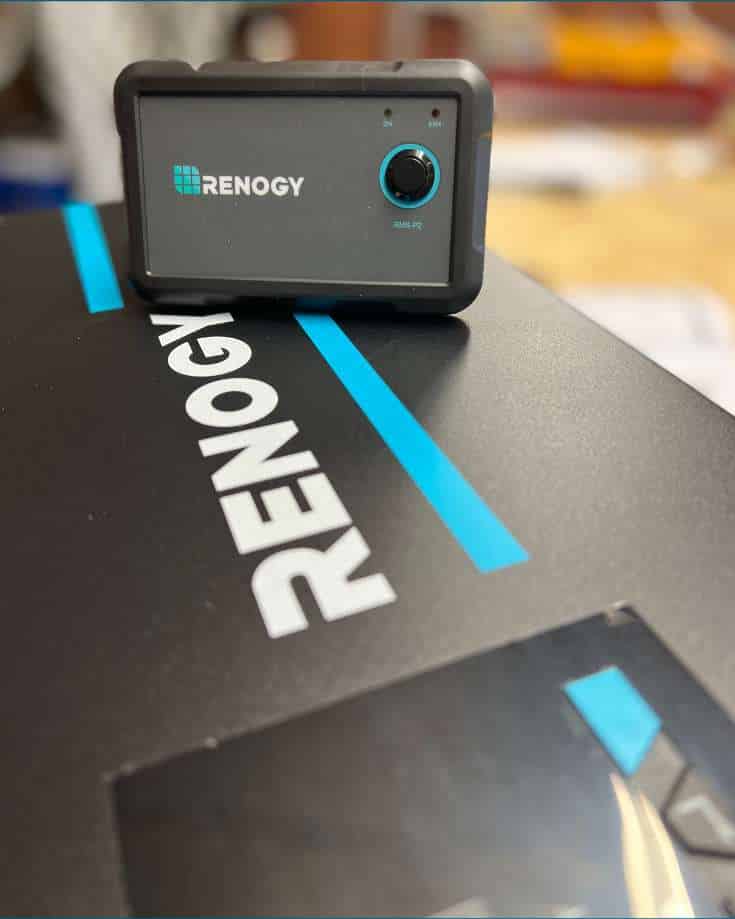
At its core, an inverter is a device that takes DC power from your RV’s battery bank and converts it into AC power.
But why would you need to do this?
While DC power can be stored in your battery, AC power cannot. But any household appliances you want to run – like microwaves or coffee makers – require an AC power source.
Plenty of appliances can run directly off of DC power. For example, LED lights, USB sockets, and ventilation fans are all perfectly happy running off the battery bank alone.
But what happens when you’re boondocking or camping off-grid and don’t have access to shore power? Your only source of power is your battery bank which provides DC power.
This is where an inverter comes in handy. By converting the DC power into AC, you can run your household appliances without having to fire up your RV’s generator (which can be noisy and a bit overkill if you don’t need to use those appliances often).
It’s worth noting that not all inverters are created equal. Some may not be powerful enough to handle larger appliances like air conditioners or refrigerators.
So before purchasing an inverter for your RV solar system, make sure it’s compatible with your battery bank and the appliances you plan on using it for!
Wiring
Using the correct wire sizes is crucial when wiring up your RV solar system. This is because voltage losses can occur over the length of the circuit, which can negatively impact the efficiency of your system.
In most cases, you’ll want to use larger wire sizes than you might expect to minimize these losses and ensure your solar setup can generate as much power as possible.
Another important consideration when wiring up multiple solar panels is how they are configured – either in series or parallel.
When wired in series, the voltage output of each panel is added together while the amperage remains constant.
On the other hand, when wired in parallel, each panel’s amperage output is added together while the voltage remains constant.
The way you connect your solar panels will determine what size solar charger you need. But they also perform in different ways in the shade.
Choosing between a series or parallel configuration will ultimately depend on your specific needs and setup.
Fuses
When setting up your RV solar system, one crucial component that you should never overlook is the fuse.
Fuses are important in protecting your system from electrical overload and potential damage or fire.
In a typical RV solar setup, there are two places where fuses should be installed:
- between the solar panel and the solar charger, and
- between the solar charger and the battery.
The fuse between the solar panel and the charger is known as a PV fuse (short for photovoltaic). It’s designed to protect your system against any overcurrents due to short circuits or other issues with the solar panels.
The size of this fuse will depend on several factors, including the amperage output of your panels.
Generally speaking, it should be rated at no more than 1.25 times the maximum current output of your panels.
The second fuse, located between the charger and the battery, is called a battery fuse. It protects against any overcurrents that may occur during charging.
This can happen if something goes wrong with your charger or an issue with your battery bank.
The size of this fuse will depend on several factors, including the amperage output of your charger. Again, it should be rated at no more than 1.25 times the maximum current output of your charger.
It’s important to note that using fuses in your RV solar setup isn’t just a good idea – most electrical codes and standards require it.
So if you plan to install a DIY solar system in your RV, include these fuses to keep yourself safe and ensure that everything runs smoothly.
While fuses may seem like a small detail in the grand scheme, they play an incredibly important role in keeping your RV solar system operating safely and efficiently for years to come!
How Many Solar Panels Do I Need On My RV?
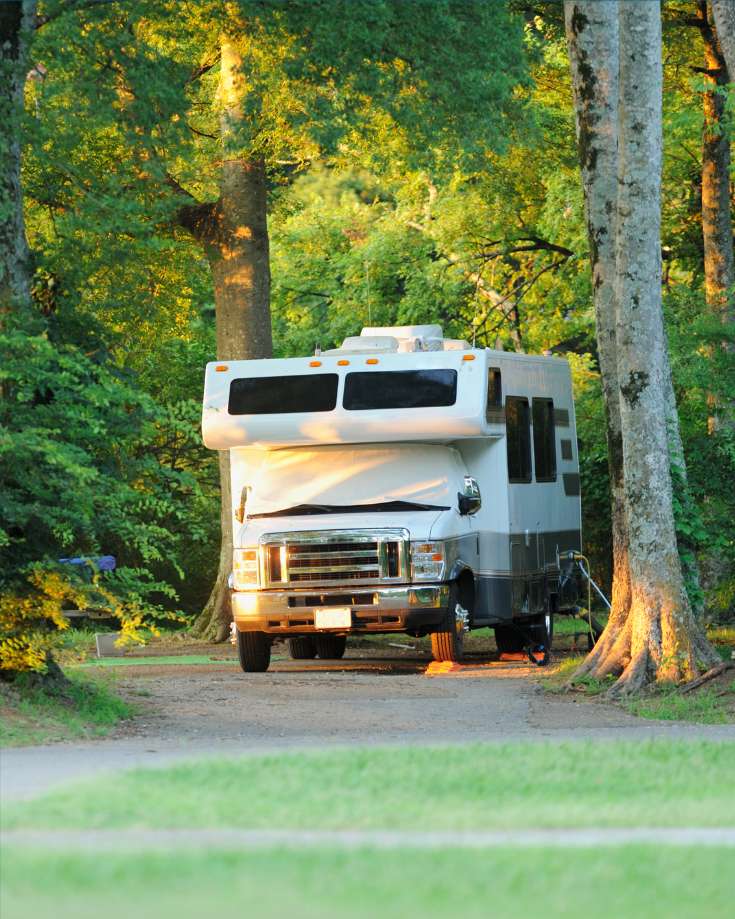
If you plan to take your RV off the grid, determining how much solar power you need may feel overwhelming.
But with a little bit of planning upfront, you can ensure you have all the power you need for successful boondocking and adventurous road trips.
Not only will proper sizing of your RV solar system save you from headaches and frustration down the line, but it can also help you avoid overspending or under-sizing your system.
So where do you start? There are a few factors to consider when sizing your RV solar system.
- First and foremost, calculate your daily energy consumption by adding up the wattage of all AC and DC appliances and devices you use daily. This will give you an idea of how much power you’ll need to generate to keep everything running smoothly.
- Next, choose high-quality solar panels that are efficient and reliable.
- Once your panels are selected, it’s important to connect them in the most efficient way possible – either in series or parallel, depending on your specific setup.
- Finally, don’t forget about battery capacity! Having enough backup power is crucial for those cloudy days when solar generation may be limited. So ensure your battery bank is large enough to store all the energy your panels generate throughout the day.
Overall, sizing an RV solar system might seem daunting at first glance, but it’s achievable with careful planning and consideration of these important factors!
How Much Does An RV Solar System Cost?
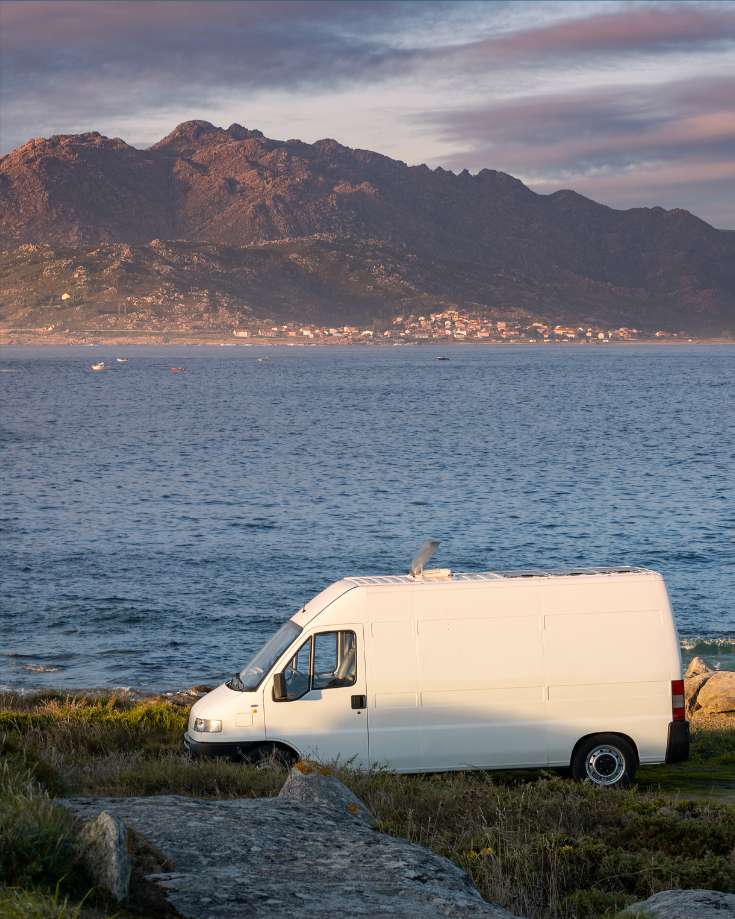
The cost of an RV solar system can vary based on the size of the system, the quality of components used, and whether you already have some of the components fitted.
We recommend Renogy RV Solar Kits. They’re great quality but also affordable.
Their kits range from about $400 for a 100w kit without a battery to $1300 for an 800w solar panel kit.
You’ll need to add in the cost of the battery. Budget for around $450 per 100ah of lithium.
A small setup of 100w with a 100ah battery could cost around $1000, while a monster system of 800w with a 600ah battery could come in around $4500.
While the upfront cost may seem high, investing in an RV solar system can save you money over time by reducing your reliance on expensive campground hookups or noisy generators.
Plus, it’s a great way to reduce your carbon footprint and enjoy off-the-grid adventures without sacrificing modern comforts.
How To Hook Up Solar Panels to RV Batteries
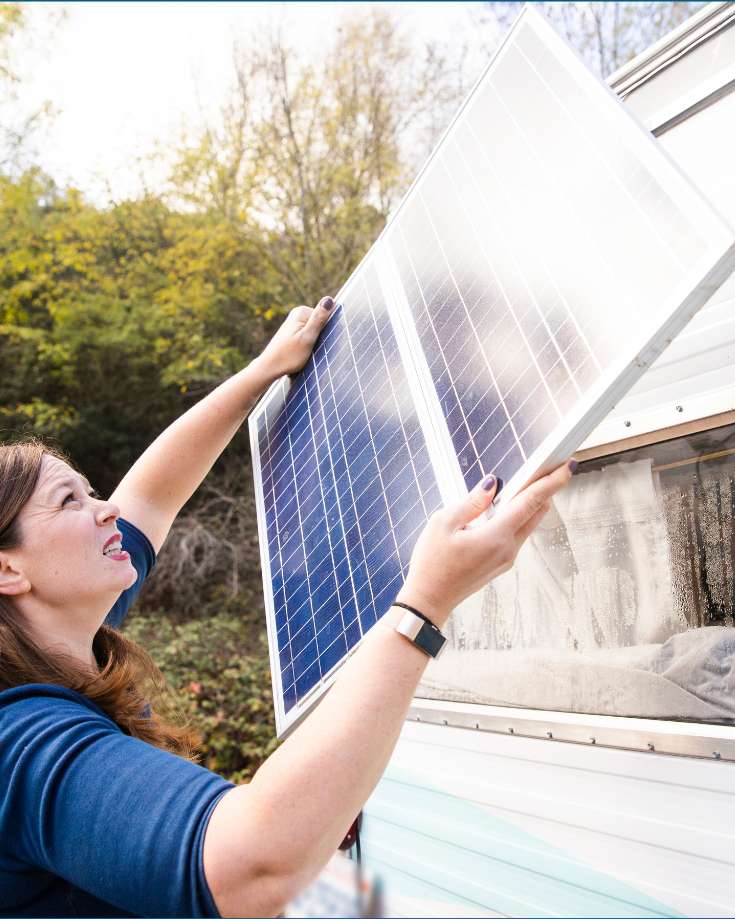
Hooking up solar panels to your RV batteries can seem daunting, but it’s a fairly straightforward process that most RV owners can do themselves with little guidance.
Here are the basic steps you’ll need to follow:
- Determine the best location for your solar panels
- Install a charge controller
- Connect the charge controller to your battery bank
- Connect the solar panels to the charge controller
It’s important to note that this is just an overview of how to hook solar panels to RV batteries.
Before installing a solar system for your RV, it’s crucial to have a wiring diagram matching your system’s size and configuration.
A wiring diagram provides a detailed blueprint of how to connect all the components in your solar system, including the solar panels, charge controller, battery bank, inverter, and any other accessories you may be using.
The size of your solar system will determine the complexity of the wiring diagram needed.
For example, a small basic system with only one or two solar panels may require a simple wiring diagram with just a few components.
On the other hand, a larger system with multiple panels and batteries will require a more complex wiring diagram that considers factors such as wire gauge, fuse ratings, and maximum amperage.
An accurate wiring diagram for your specific RV solar setup can save time, money, and headaches during installation. It will help you connect everything properly and is a great resource for troubleshooting on the road..
Are Solar Panels For An RV Worth It?
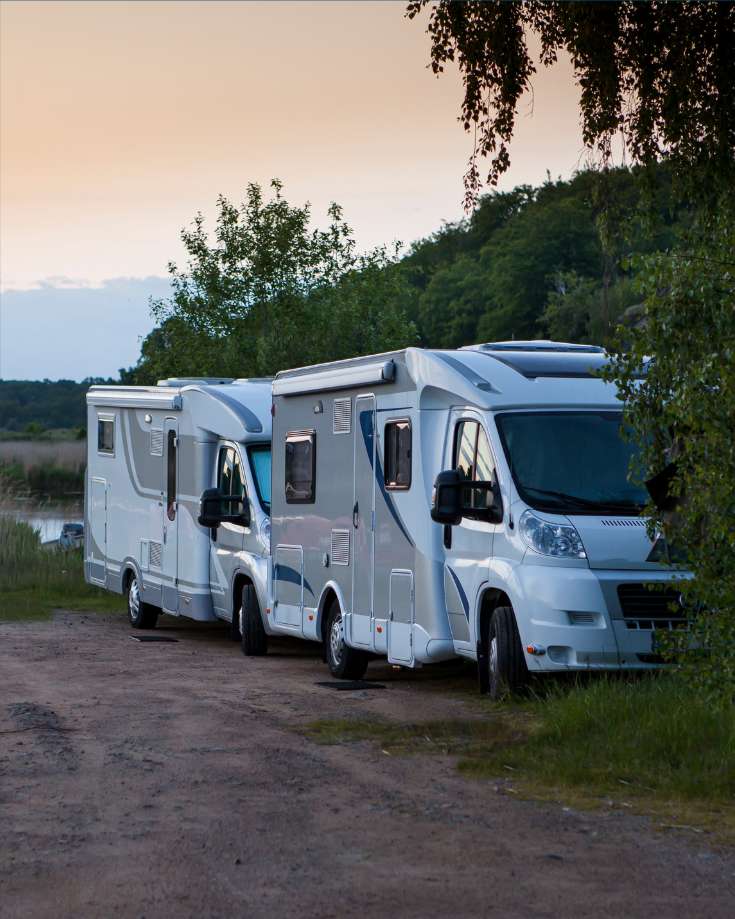
Yes, solar panels for an RV can be a great investment and are definitely worth considering if you’re looking to increase your energy independence and save money on utility bills.
Here are some of the benefits of using solar panels for an RV:
- Cost savings: By harnessing the sun’s power, you can significantly reduce or eliminate your reliance on traditional energy sources like generators or shore power hookups, which can be expensive over time.
- Increased flexibility: With solar panels, you can camp in more remote locations without worrying about finding an electrical hookup. This means you can explore off-the-beaten-path destinations and enjoy more privacy and natural surroundings.
- Environmental friendliness: Solar power is a clean, renewable energy source without harmful emissions or contributing to climate change. By using solar panels for your RV, you’re helping to reduce your carbon footprint and protect the environment.
- Quiet operation: Solar panels are silent, unlike generators, which can be noisy and disruptive to wildlife and other campers. They won’t disturb the peace and quiet of nature.
While an upfront cost is associated with installing solar panels for an RV, many people find that they pay for themselves through reduced energy costs and increased convenience.
Overall, if you enjoy camping or living off-grid in your RV and want more control over your energy usage while reducing environmental impact – then investing in solar panels is absolutely worth it!
Do you have any personal experiences or tips to share about using RV solar panels? We would love to hear from you and continue the conversation in the comments section below. Your insights could help other readers make the most out of their RV solar systems.
Graham Bogie

Graham is a seasoned marine electrical engineer with two decades of experience designing customized electrical systems for plant machinery and converting campers and overland vehicles. His expertise has led him to author the reputable Campervan Electrics Handbook and become the chief designer of the RV Wiring Design Tool. As a knowledgeable figure in the field, his YouTube channel, blog, Facebook group, and newsletter, offering electrical advice and product reviews, reach more than a million users each year.

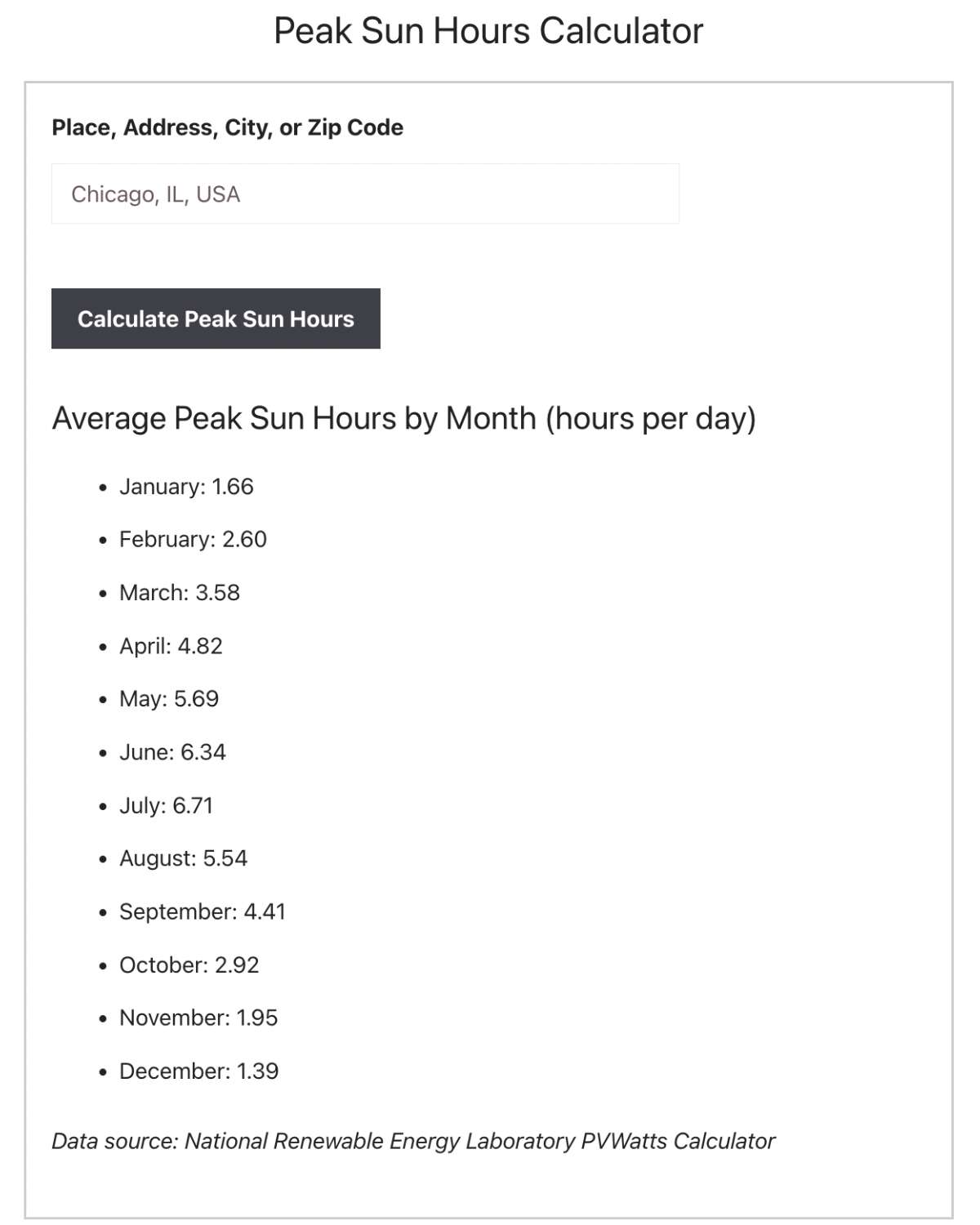
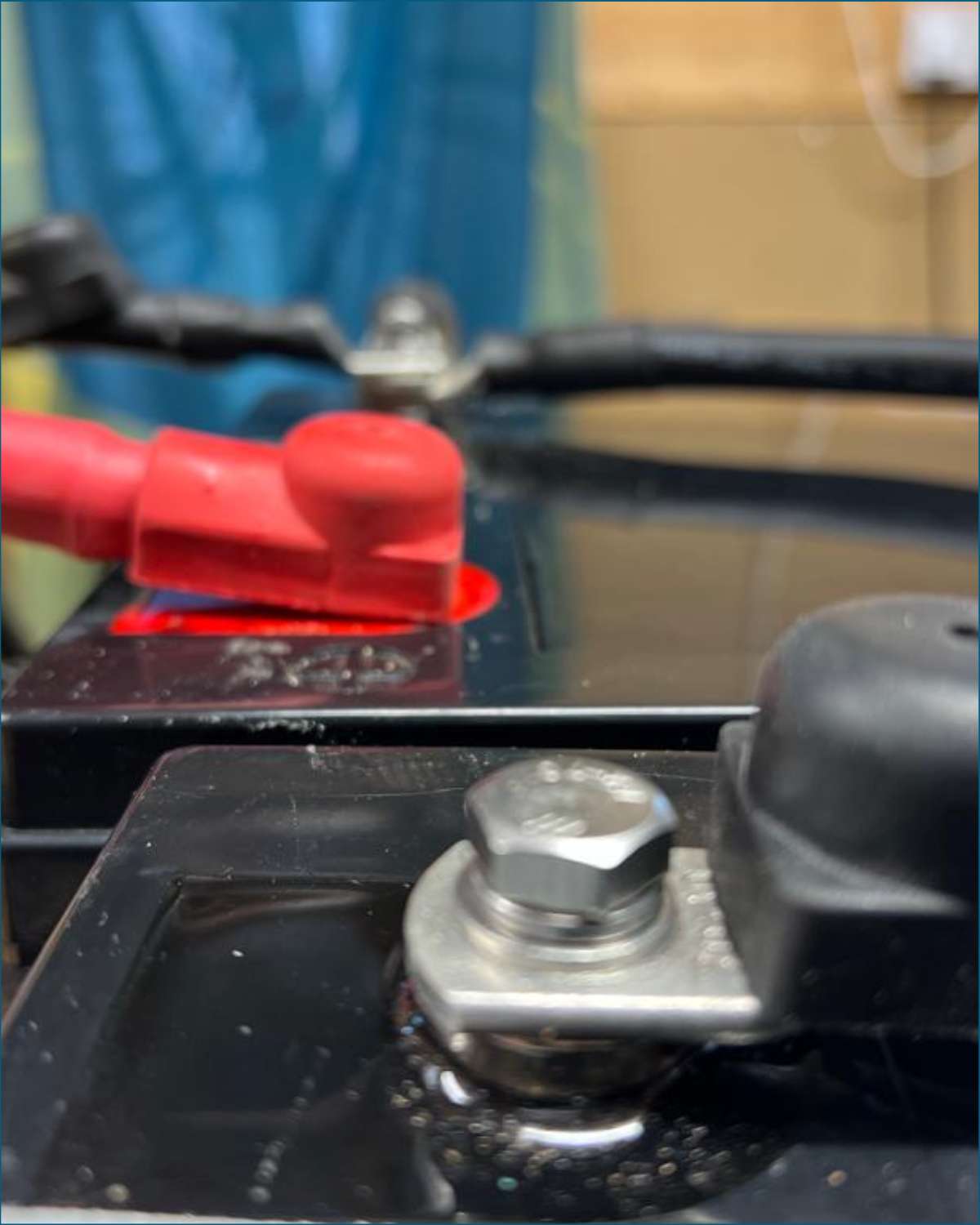

Hi, I recently installed a solar system on my 35′ Class A RV. I went with a 48 volt system, as a 12 volt would be a joke to try and run my rig. I have 2, 48 volt 100ah lithium batteries, 48 volt Mppt inverter, and 14 flexible panels on my roof. My inverter won’t start to work until I have at least 120 volts from my panels. I have 7 panels wired in series X 2, and paralleled both sets of 7 panels before going into my inverter. I’m getting around 160 volts coming in from my panels, which is optimum for my inverter, and getting approximately 19 amps charging to my batteries. I get double that from using my generator or shore power to charge my batteries. I’ve been able to not run my generator until recently, as using the AC pulls a lot of amps. I’ve ordered a portable air conditioner which only pulls .7 amps, compared to the 14 amps my central AC pulls. The AC unit said it’s good for 500 square feet, we’ll see. I think anyone considering putting a solar system on a RV over 25′ should go with a 48 volt system, 24 at a bare minimum. Suggesting putting in a 12 volt 800 watt system to someone is irresponsible, as they will have to buy all new equipment, when they find out they can only run a few appliances on a 12 volt system.